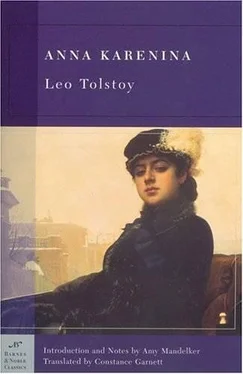Leo Tolstoy - Anna Karenina
Здесь есть возможность читать онлайн «Leo Tolstoy - Anna Karenina» весь текст электронной книги совершенно бесплатно (целиком полную версию без сокращений). В некоторых случаях можно слушать аудио, скачать через торрент в формате fb2 и присутствует краткое содержание. Жанр: Классическая проза, на английском языке. Описание произведения, (предисловие) а так же отзывы посетителей доступны на портале библиотеки ЛибКат.
- Название:Anna Karenina
- Автор:
- Жанр:
- Год:неизвестен
- ISBN:нет данных
- Рейтинг книги:4 / 5. Голосов: 1
-
Избранное:Добавить в избранное
- Отзывы:
-
Ваша оценка:
- 80
- 1
- 2
- 3
- 4
- 5
Anna Karenina: краткое содержание, описание и аннотация
Предлагаем к чтению аннотацию, описание, краткое содержание или предисловие (зависит от того, что написал сам автор книги «Anna Karenina»). Если вы не нашли необходимую информацию о книге — напишите в комментариях, мы постараемся отыскать её.
Anna Karenina — читать онлайн бесплатно полную книгу (весь текст) целиком
Ниже представлен текст книги, разбитый по страницам. Система сохранения места последней прочитанной страницы, позволяет с удобством читать онлайн бесплатно книгу «Anna Karenina», без необходимости каждый раз заново искать на чём Вы остановились. Поставьте закладку, и сможете в любой момент перейти на страницу, на которой закончили чтение.
Интервал:
Закладка:
"Then we shall see," Stepan Arkadyevich said to himself, and getting up he put on a gray dressing gown lined with blue silk, tied the tassels in a knot, and, drawing a deep breath of air into his broad chest, he walked to the window with his usual confident step, turning out his feet that carried his full frame so easily. He pulled up the blind and rang the bell loudly. It was at once answered by the appearance of an old friend, his valet, Matvei, carrying his clothes, his boots and a telegram. Matvei was followed by the barber with all the necessaries for shaving.
"Are there any papers from the board?" asked Stepan Arkadyevich, taking the telegram and seating himself at the looking glass.
"On the table," replied Matvei, glancing with inquiring sympathy at his master; and, after a short pause, he added with a sly smile:
"They've sent from the carriage jobber."
Stepan Arkadyevich made no reply, but merely glanced at Matvei in the looking glass. The glance, in which their eyes met in the looking glass, made it clear that they understood one another. Stepan Arkadyevich's eyes seemed to ask: "Why do you tell me that? Don't you know?"
Matvei put his hands in his jacket pockets, thrust out one leg, and gazed silently, with a good-humored, faint smile, at his master.
"I told them to come on Sunday, and till then not to trouble you or themselves for nothing," he said. He had obviously prepared the sentence beforehand.
Stepan Arkadyevich saw Matvei wanted to make a joke and attract attention to himself. Tearing open the telegram, he read it through, guessing at the words, misspelled as they always are in telegrams, and his face brightened.
"Matvei, my sister Anna Arkadyevna will be here tomorrow," he said, checking for a minute the sleek, plump hand of the barber, cutting a pink path between his long, curly side whiskers.
"Thank God!" said Matvei, showing by this response that he, like his master, realized the significance of this arrival: Anna Arkadyevna, the sister his master was so fond of, might bring about a reconciliation between husband and wife.
"Alone, or with her husband?" inquired Matvei.
Stepan Arkadyevich could not answer, as the barber was at work on his upper lip, and he raised one finger. Matvei nodded at the looking glass.
"Alone. Is the room to be got ready upstairs?"
"Inform Darya Alexandrovna: where she orders."
"Darya Alexandrovna?" Matvei repeated, as though in doubt.
"Yes, inform her. Here, take the telegram; give it to her, and then do what she tells you."
"You want to try it out," Matvei guessed, but only said: "Yes, sir."
Stepan Arkadyevich was already washed and combed and ready to be dressed, when Matvei, stepping slowly in his creaky boots, came back into the room with the telegram in his hand. The barber had gone.
"Darya Alexandrovna told me to inform you that she is going away. 'Let him'- that is you- 'do as he likes,'" he said, laughing only with his eyes, and, putting his hands in his pockets, he watched his master with his head on one side. Stepan Arkadyevich was silent a minute. Then a good-humored and rather pitiful smile showed itself on his handsome face.
"Eh, Matvei?" he said, shaking his head.
"Never mind, sir; everything will come round," said Matvei.
"Come round?"
"Just so, sir."
"Do you think so?- Who's there?" asked Stepan Arkadyevich, hearing the rustle of a woman's dress at the door.
"It's I," said a firm, pleasant feminine voice, and the stern, pockmarked face of Matriona Philimonovna, the nurse, was thrust in at the door.
"Well, what's the matter, Matriosha?" queried Stepan Arkadyevich, meeting her in the doorway.
Although Stepan Arkadyevich was completely in the wrong as regards his wife, and was conscious of this himself, almost everyone in the house (even the nurse, Darya Alexandrovna's chief ally) was on his side.
"Well, what now?" he asked cheerlessly.
"Go to her, sir; own your fault again. Maybe God will aid you. She is suffering so, it's pitiful to see her; and besides, everything in the house is topsy-turvy. You must have pity, sir, on the children. Beg her forgiveness, sir. There's no help for it! One must pay the piper…"
"But she won't see me."
"You do your part. God is merciful; pray to God, sir- pray to God."
"Come, that'll do, you can go," said Stepan Arkadyevich, blushing suddenly. "Well, now, let's dress," he turned to Matvei and resolutely threw off his dressing gown.
Matvei was already holding up the shirt like a horse's collar, and, blowing off some invisible speck, he slipped it with obvious pleasure over the well-cared-for person of his master.
III
When he was dressed, Stepan Arkadyevich sprinkled some scent on himself, pulled down his shirt cuffs, distributed into his pockets his cigarettes, pocketbook, matches and watch, with its double chain and seals, and, shaking out his handkerchief, feeling himself clean, fragrant, healthy and physically at ease, in spite of his misfortune, he walked with a slight swing of each leg into the dining room, where coffee was already waiting for him- and, alongside of his cup, the letters and papers from the office.
He read the letters. One was very unpleasant, from a merchant who was buying a forest on his wife's property. To sell this forest was absolutely essential; but at present, until he was reconciled with his wife, the subject could not be discussed. The most unpleasant thing of all was that his pecuniary interests should in this way enter into the question of his reconciliation with his wife. And the idea that he might be led on by his interests, that he might seek a reconciliation with his wife on account of the sale of the forest- that idea hurt him.
When he had finished his letters, Stepan Arkadyevich moved the office papers close to him, rapidly looked through two cases, made a few notes with a big pencil, and, pushing away the papers, turned to his coffee. Sipping it, he opened a still damp morning paper and began to read it.
Stepan Arkadyevich took in and read a liberal paper, not an extreme one, but one advocating the views held by the majority. And in spite of the fact that science, art and politics had no special interest for him, he firmly held those views on all these subjects which were held by the majority and by his paper, and he only changed them when the majority changed them- or, more strictly speaking, he did not change them, but they imperceptibly changed of themselves within him.
Stepan Arkadyevich had not chosen his political opinions or his views- these political opinions and views had come to him of themselves- just as he did not choose the shapes of his hat and coat, but simply accepted those that were being worn. And for him, living in a certain society- owing to the need, ordinarily developed at years of discretion, for some degree of mental activity- to have views was just as indispensable as to have a hat. If there was a reason for his preferring liberal to conservative views, which were held also by many of his circle, it arose not from his considering liberalism more rational, but from its being in closer accordance with his manner of life. The liberal party said that in Russia everything was wrong, and indeed Stepan Arkadyevich had many debts and was decidedly short of money. The liberal party said that marriage was an institution quite out of date, and that it stood in need of reconstruction, and indeed family life afforded Stepan Arkadyevich little gratification, and forced him into lying and hypocrisy, which were so repulsive to his nature. The liberal party said, or rather allowed it to be understood, that religion was only a curb to keep in check the barbarous classes of the people, and indeed Stepan Arkadyevich could not stand through even a short service without his legs aching, and could never make out what was the object of all the terrible and high-flown language about another world when life might be so very amusing in this world. And with all this Stepan Arkadyevich, who liked a merry joke, was fond of embarrassing some plain man by saying that if one were to pride oneself on one's origin, one ought not to stop at Rurik and disown the founder of the line- the monkey. And so liberalism had become a habit of Stepan Arkadyevich, and he liked his newspaper, as he did his cigar after dinner, for the slight fog it diffused in his brain. He read the leading article, which maintained that it was quite senseless in our day to raise an outcry that radicalism was threatening to swallow up all conservative elements, and that the government ought to take measures to crush the revolutionary hydra; that, on the contrary, "in our opinion the danger lies not in that imaginary revolutionary hydra, but in the obstinacy of traditionalism clogging progress," etc., etc. He read another article, too, a financial one, which alluded to Bentham and Mill, and dropped some innuendoes reflecting on the ministry. With his characteristic quick-wittedness he caught the drift of each innuendo, divined whence it came, at whom and on what ground it was aimed, and that afforded him, as it always did, a certain gratification. But today that gratification was embittered by Matriona Philimonovna's advice and the unsatisfactory state of his household. He read, too, that Count Beist was rumored to have left for Wiesbaden, and that one need have no more gray hair, and of the sale of a light carriage, and of a young person seeking a situation; but these items of information did not give him, as usual, a quiet, ironical gratification.
Читать дальшеИнтервал:
Закладка:
Похожие книги на «Anna Karenina»
Представляем Вашему вниманию похожие книги на «Anna Karenina» списком для выбора. Мы отобрали схожую по названию и смыслу литературу в надежде предоставить читателям больше вариантов отыскать новые, интересные, ещё непрочитанные произведения.
Обсуждение, отзывы о книге «Anna Karenina» и просто собственные мнения читателей. Оставьте ваши комментарии, напишите, что Вы думаете о произведении, его смысле или главных героях. Укажите что конкретно понравилось, а что нет, и почему Вы так считаете.












